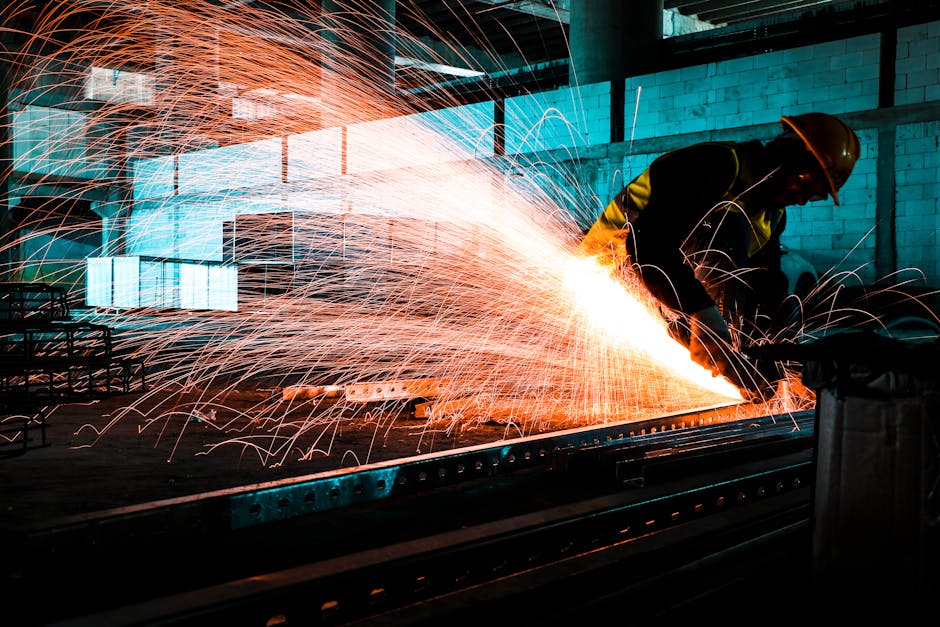Advancements in Sheet Metal Fabrication and Its Role in UK Engineering
Advancements in sheet metal fabrication have significantly influenced the landscape of engineering in the UK. This evolution has seen a convergence of innovative technologies, materials, and processes, revolutionising the capabilities and applications of sheet metal in various industries.
From the automotive sector to aerospace and construction engineering, the integration of cutting-edge fabrication techniques has led to enhanced product quality, improved efficiency, and the ability to manufacture complex components with precision. These advancements have not only propelled the UK engineering industry forward but have also played a crucial role in shaping the global engineering landscape.
In this brief exploration, we will delve into the pivotal role of sheet metal fabrication advancements in driving progress and innovation in UK engineering.
Key Takeaways
- The historical evolution of sheet metal fabrication, particularly during the industrial revolution in the UK, has greatly advanced the field.
- The integration of advanced materials, such as new alloys and composite materials, has revolutionised sheet metal fabrication and expanded its capabilities.
- Cutting-edge technologies, including additive manufacturing, robotic automation, and advanced software, are enhancing the efficiency and productivity of sheet metal fabrication.
- Sheet metal fabrication plays a crucial role in various industries, such as the automotive and aerospace sectors, by enabling the development of lightweight and durable components for improved fuel efficiency, safety, and performance.
Historical Evolution of Sheet Metal Fabrication

The historical evolution of sheet metal fabrication has significantly contributed to the development of modern engineering practises in the UK. The roots of sheet metal fabrication can be traced back to ancient origins, where early civilisations utilised basic tools and techniques to shape and manipulate metal for various purposes. Over time, these rudimentary methods evolved into more sophisticated and evolutionary techniques, paving the way for the intricate and precise metal fabrication processes we see today.
In the UK, the industrial revolution played a pivotal role in advancing sheet metal fabrication, with the introduction of mechanised tools and processes leading to increased efficiency and precision.
The integration of advanced materials in sheet metal fabrication has been a result of this historical evolution, allowing for the creation of complex structures and components that were previously unattainable. This transition into the use of advanced materials has not only transformed the capabilities of sheet metal fabrication but has also revolutionised the field of engineering as a whole.
Integration of Advanced Materials

The integration of advanced materials in sheet metal fabrication has brought about new alloy applications and composite material innovations. These advancements have expanded the possibilities for engineering solutions, offering enhanced strength, durability, and lightweight properties.
As the demand for high-performance and sustainable materials grows, the role of advanced materials in sheet metal fabrication becomes increasingly significant in driving innovation in UK engineering.
New Alloy Applications
Our team has been exploring new alloy applications to integrate advanced materials into sheet metal fabrication processes, enhancing the performance and durability of engineering components in the UK. This involves advanced alloy development and innovative manufacturing techniques to meet the increasingly demanding requirements of modern engineering.
-
Alloy Development: We are researching and developing new alloys with superior mechanical properties and corrosion resistance to expand the capabilities of sheet metal fabrication.
-
Advanced Manufacturing Techniques: Utilising cutting-edge manufacturing processes such as additive manufacturing and hot isostatic pressing to achieve precise control over alloy microstructures and properties.
-
Performance Enhancement: Integrating advanced materials into sheet metal fabrication to improve component performance, reduce weight, and increase energy efficiency.
-
Durability Improvement: Developing alloys that exhibit enhanced durability and longevity in harsh operating environments, ensuring the reliability of engineering components.
Compositae Material Innovations
Incorporating composite materials into sheet metal fabrication processes enables the integration of advanced materials, expanding the potential for enhanced performance and durability in UK engineering components. Compositae material properties, such as high strength-to-weight ratio and corrosion resistance, offer substantial benefits over traditional materials. By utilising composites, engineers can achieve improved structural integrity while reducing overall weight, leading to increased fuel efficiency in transportation and reduced energy consumption in various applications.
Moreover, the sustainability impact of composite materials, including their recyclability and potential for reduced waste, alines with the growing emphasis on environmentally conscious manufacturing practises. As the engineering industry continues to prioritise sustainable and high-performance solutions, integrating advanced composite materials into sheet metal fabrication processes is pivotal for meeting these evolving demands.
This development in composite material integration sets the stage for exploring cutting-edge technologies in fabrication.
Cutting-edge Technologies in Fabrication

As sheet metal fabrication continues to evolve, the incorporation of cutting-edge technologies has become crucial for enhancing efficiency and precision in the UK engineering industry.
Two key technologies driving this evolution are additive manufacturing and robotic automation. Additive manufacturing, also known as 3D printing, allows for the production of complex metal components with reduced material waste and lead times. This technology enables engineers to create intricate designs that were previously unachievable through traditional fabrication methods.
On the other hand, robotic automation plays a pivotal role in streamlining production processes, as robots can perform repetitive tasks with consistent precision, ultimately increasing overall productivity. Additionally, the integration of advanced software and artificial intelligence into fabrication processes has further improved efficiency and quality control.
These technologies not only enhance the capabilities of sheet metal fabrication but also pave the way for innovative engineering solutions in various industries. The UK engineering sector is at the forefront of embracing these cutting-edge technologies, positioning itself as a leader in advanced sheet metal fabrication.
Impact on Automotive Industry

The advancements in sheet metal fabrication have had a significant impact on the automotive industry in the UK. One of the key areas where this impact is evident is in the development of lightweight designs that contribute to enhanced fuel efficiency. Sheet metal fabrication techniques enable the creation of intricate and lightweight components, allowing automotive manufacturers to reduce the overall weight of vehicles without compromising structural integrity. This has become crucial in the industry’s drive towards more environmentally friendly and economical vehicles.
Furthermore, sheet metal fabrication plays a pivotal role in ensuring vehicle safety and crashworthiness. Advanced fabrication methods allow for the production of high-strength and durable components that are essential for meeting rigorous safety standards. The ability to fabricate complex shapes and structures with precision enhances the overall safety of vehicles, protecting occupants in the event of a collision.
As the automotive industry continues to benefit from these advancements, the application of sheet metal fabrication is also expanding into aerospace engineering, where similar innovations are driving progress in aircraft manufacturing and performance.
Aerospace Applications and Innovations

Significant advancements in sheet metal fabrication have led to transformative innovations in aerospace engineering, revolutionising the production and performance of aircraft components. The aerospace industry has witnessed remarkable advancements in sheet metal fabrication, impacting the sector in several ways:
-
Weight Reduction: New fabrication techniques have enabled the production of lighter yet stronger aircraft components, leading to enhanced fuel efficiency and overall performance.
-
Complex Geometries: Innovative fabrication methods have facilitated the creation of intricate and complex shapes, optimising aerodynamics and structural integrity of aerospace parts.
-
Material Utilisation: Advanced fabrication processes have allowed for the efficient use of materials, reducing waste and enhancing sustainability in aerospace manufacturing.
-
Cost Efficiency: Streamlined fabrication techniques have contributed to cost savings in the production of aircraft components, making aerospace engineering more economically viable.
These aerospace advancements in sheet metal fabrication have significantly impacted the industry, driving progress in aircraft design, performance, and sustainability.
As the demand for more efficient and advanced aircraft continues to grow, the role of sheet metal fabrication in aerospace engineering will remain pivotal in shaping the future of aviation.
Role in Advancing Construction Engineering

Advancement in sheet metal fabrication has played a crucial role in enhancing construction engineering in the UK. The implementation of advanced sheet metal fabrication techniques has significantly impacted infrastructure design and construction processes. The use of sustainable materials and practises in sheet metal fabrication has led to significant advances in sustainability within the construction engineering sector. These advances have allowed for the development of more environmentally friendly construction processes and structures, alining with the UK’s commitment to reducing carbon emissions and promoting sustainable development.
Furthermore, the impact on infrastructure design has been substantial, with sheet metal fabrication enabling the creation of complex and innovative architectural designs. The use of precision-engineered sheet metal components has facilitated the construction of durable and efficient structures. This has not only improved the overall quality and longevity of infrastructure but has also contributed to cost savings and reduced maintenance requirements.
Frequently Asked Questions
What Are the Environmental Impacts of Sheet Metal Fabrication and How Are They Being Addressed in the UK Engineering Industry?
Environmental impacts of sheet metal fabrication include energy consumption, waste generation, and emissions. To address these, the UK engineering industry is implementing sustainability initiatives such as adopting renewable energy, recycling scrap metal, and optimising production processes for efficiency and reduced environmental footprint.
How Does Sheet Metal Fabrication Contribute to the Development of Sustainable Infrastructure in the Uk?
Sustainable infrastructure in the UK benefits from sheet metal fabrication through its ability to provide durable, recyclable, and energy-efficient materials. These engineering advancements contribute to the development of infrastructure that is both environmentally friendly and long-lasting.
What Are the Potential Challenges and Limitations of Integrating Advanced Materials in Sheet Metal Fabrication Processes?
Challenges in integrating advanced materials into sheet metal fabrication include compatibility, cost, and process optimisation. Innovation in manufacturing processes is essential to overcome these limitations, ensuring seamless integration of new materials for enhanced performance and sustainability.
How Does Sheet Metal Fabrication Technology Address the Need for Lightweight Materials in the Automotive Industry?
Sheet metal fabrication technology addresses the automotive industry’s need for lightweight materials by utilising advanced processes like hydroforming and roll forming. These methods enable the creation of complex, lightweight components that enhance vehicle performance and fuel efficiency.
What Are the Future Trends and Advancements in Sheet Metal Fabrication That Could Impact the Construction Engineering Sector in the Uk?
Future trends in sheet metal fabrication for the construction engineering sector in the UK include increased automation technology, sustainable materials, and innovation strategies. These advancements aim to enhance efficiency, reduce environmental impact, and improve overall project outcomes.
Conclusion
The evolution of sheet metal fabrication has played a crucial role in advancing engineering in the UK.
From its historical roots to the integration of advanced materials and cutting-edge technologies, this process has significantly impacted industries such as automotive, aerospace, and construction.
Like a finely crafted piece of metal, the advancements in sheet metal fabrication have shaped the foundation of modern engineering, providing strength, durability, and precision to the structures and machines that propel our society forward.
Contact us to discuss our services now!
